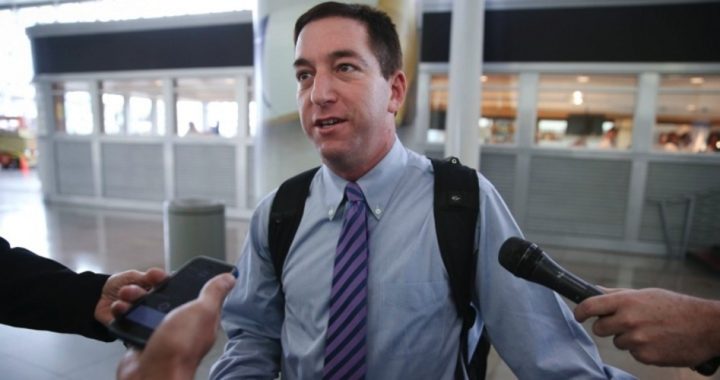
Investigative reporter Glenn Greenwald (shown) has promised to name victims of NSA warrantless surveillance, calling such an expose “imminent” in an interview with Fox News. Such an exposé may prove to be a game-changer in congressional and public debate on granting the NSA unconstitutional warrantless surveillance powers.
Greenwald has been the primary recipient of information about the once-secret NSA programs revealed by former NSA contractor Edward Snowden. Greenwald told Shepard Smith of Fox News that his next revelations will involve naming names about how NSA surveillance has strayed from merely going after terrorists to engaging in politics:
Greenwald: All the people on whom we are reporting consented to it. They participated in the story. They spoke on camera. We are publishing video.
Smith: Will we recognize these names and some of these people?
Greenwald: You will definitely recognize some of these names and some of these people.
Smith: From politics? From Government? From what?
Greenwald: From a little of all of that.
Smith: Okay…
Greenwald: I can’t give hints. But they are people who, when you see that they are the targets you will see that they have nothing to do with terrorism and that they are definitely people engaged in political activism that’s controversial.
Greenwald said that revelations will be published on his new website, The Intercept, but refused to state a specific date of publication. “The story is imminent,” Greenwald told Smith June 23. “You will definitely recognize some of these names and some of these people.”
The importance of publishing the names of victims of NSA warrantless snooping is that it will put a human face on the flagrant violation of the Fourth Amendment and reveal the practical reasons for the amendment’s adoption back in 1791. Moreover, proponents of unconstitutional surveillance of American citizens have pinned their arguments to claims that omnipresent NSA vacuuming-up of American citizens’ data had never been abused.
President Obama claimed NSA authority has never been abused in a December 20, 2013 press conference, stating,“there had not been evidence and there continues not to be evidence that the particular program had been abused in how it was used.” Likewise, establishment House Republican leaders have vigorously defended NSA warrantless surveillance. House Select Intelligence Committee Chairman Mike Rogers (R-Mich.) claimed on May 14, 2014,
Every investigation, every group that reviewed it, found no illegal activity, no abuses, and that it was lawful. It’s hard to say that there was some horrible rogue agency when all of the groups that investigated it came to the same conclusion.
Of course, what Obama and Rogers said had already been publicly established as patently false. Back on September 11, 2013, the Inspector General’s office sent a letter to Senator Charles Grassley (R-Iowa) acknowledging that the NSA had violated privacy protocols dozens of times, and that some NSA employees used the information to spy on their wives and girlfriends. That particular set of abuses spawned the NSA handle “LOVEINT.”
Senate Select Intelligence Committee Chairman Dianne Feinstein (D-Calif.) tried to minimize the LOVEINT abuses that were reported publicly, claiming, “Any case of noncompliance is unacceptable, but these small numbers of cases do not change my view that NSA takes significant care to prevent any abuses and that there is a substantial oversight system in place.”
If Greenwald successfully documents that the NSA has taken the leap toward surveiling people for their political views, he will reveal that establishment flunkies for NSA surveillance are liars, and perhaps create the kind of synergy that spawned the Church and Pike Committees that reined in warrantless political surveillance by the FBI and CIA in the 1950s and 1960s.
Senator Frank Church (D-Idaho) noted back in congressional hearings in 1976 that his committee had received documentation in 1975 that the CIA had opened the mail of “the Ford Foundation, Harvard University, the Rockefeller Foundation, and such individuals as Arthur Burns, Congresswoman Bella Abzug, Jay Rockefeller, President Nixon, Martin Luther King, and Senator Hubert Humphrey, Senator Edward Kennedy, and myself whose mail had been opened, and I would like to make it clear that these names were never on the watch list, so far as we can determine. So that it is obvious that the opening of the mail was not restricted to any particular watch list, but may have gone very far afield, indeed.” The varied list of victims of violated privacy helped to spur both investigations and subsequent legislation that caged the intelligence beast until the Patriot Act was passed in the wake of the September 11, 2001 attacks.
Photo of Glenn Greenwald: AP Images



